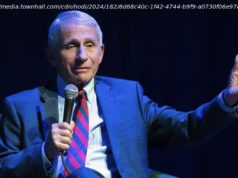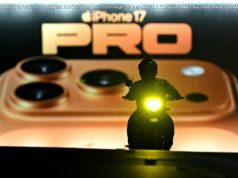The courthouse was crowded with observers, all drawn by words forbidden from the courtroom.
ALEXANDRIA, Va.—Outside the federal courthouse here, where the trial of Paul Manafort began on Tuesday morning, a handful of protesters had gathered. Lock Him Up one sign implored. Trump won’t do time for you read another. A demonstrator played a snare drum. A bank of cameras in the square across from the red-brick-and-stone courthouse was trained on the front entrance, vainly awaiting Manafort’s arrival. Journalists littered the square itself.
Inside the courtroom, the scene was equally surreal, but for the opposite reason. The room was packed with journalists there to witness the first criminal trial to result from Special Counsel Robert Mueller’s probe of possible collusion between the Trump campaign and Russia. But all that went unsaid. Judge Tom Ellis has banned references to Russia or collusion in this case, which focuses on bank- and tax-fraud charges to the tune of more than $30 million. Both the prosecution and the defense took care not to mention Mueller or Donald Trump—and even the journalists packing the ninth-floor courtroom shushed each other over the forbidden terms.
Across Jamieson Avenue from the square, the Café Gallery & Market deli was racking up more than its usual breakfast-and-sandwich business. For $2 an item, the eatery takes possession of cellphones, computers, and other electronics, none of which is permitted in the courthouse. (To bring their laptops, even attorneys in active cases must have special permission from a judge.) The café’s storage system is decidedly low-tech: A worker tapes a number on devices, tucks them under the front counter, and hands a matching number to their owners. Multiple items are bound together by rubber bands. “Today is going to be wild,” a staffer warned one journalist dropping off his phone.
Before voir dire even started, visitors crammed into Ellis’s high-ceilinged courtroom, with some trying to stand on the green carpet behind the back row of seats. Prospective jurors began filing in about 9:45 a.m. At 9:51, spectators squished into the wooden benches on the left side of the courtroom were booted to the overflow room on the sixth floor. Monitors in the overflow area showed just a sliver of the jury box but, importantly, offered a direct view of Manafort’s face. As jury selection proceeded, one of Manafort’s lawyers motioned for him to turn toward the men and women who would decide his fate. Over the next two hours, he mostly faced the table in front of him and the judge, his left hand occasionally smoothing back his hair.
The Eastern District of Virginia is known for its fast pace, or “rocket docket,” and Ellis did his part, nudging counsel to expedite and “move it along” during jury selection. Shortly before 2 p.m., when the jury was empaneled (six men and six women, with three women and one man as alternates), Ellis dismissed the remaining prospective jurors: “You’re free now to depart, and I will ensure that you’re not soon called again.” He joked that the jurors who would be staying would get a free lunch every day, though they should not hope for Baked Alaska.
With electronics banished, notebooks ruled the day. Each juror returned from lunch holding a black-and-white-speckled composition book. On the courtroom’s long wooden benches, yellow and white legal pads covered most laps. But Moleskine notebooks were also popular, along with narrow spiral-bound reporter’s notebooks, and some took notes on newspapers. Many news organizations sent multiple people so they could trade in and out, working around the electronics ban and updating stories.
Assistant U. S. Attorney Uzo Asonye gave the prosecution’s opening statement: “A man in this courtroom believed the law did not apply to him—not tax law, not banking law.” He was quickly interrupted by Ellis. “It isn’t a crime to have a lot of money and be profligate in spending,” Ellis noted, instructing Asonye to frame his points in terms of what “the evidence will show.” For the next 25 minutes, Asonye peppered his remarks with variations on those four words: “ The evidence will show he knowingly filed false tax returns .” “ The man who the evidence will show lied to the IRS .” “ The evidence will show that he omitted important information .” “ The evidence will show that Paul Manafort submitted false documents or got others to do it for him .” “ The evidence will show that they all understood they were breaking the law .” “ The evidence will show that all of this was willful .”
When Asonye finished speaking, he had not made it back to the prosecution’s table before five people darted out of the room, racing to retrieve forbidden electronics and otherwise alert editors, readers, and followers to the latest developments. A sixth person exited just as the attorney Tom Zehnle began the defense’s opening statement: “This case is about taxes and trust.”
The defense argued that Manafort’s financial dealings were the responsibility of his longtime deputy Rick Gates and that the government has built a dubious case around Gates, who cannot be trusted. Gates is cooperating with the special counsel’s investigation after reaching a plea agreement in February. Manafort is the only American charged in the Mueller investigation so far who has not struck a plea agreement with the government.
The case’s political implications loomed large on Tuesday, even if references to Mueller’s investigation or Russia remained unspoken. A guilty verdict would provide a boost to Mueller. Conversely, an acquittal would be seized on by Trump supporters to denounce the investigation. Ultimately, day one of the Manafort trial was notable for what was said—and so much that wasn’t said.






